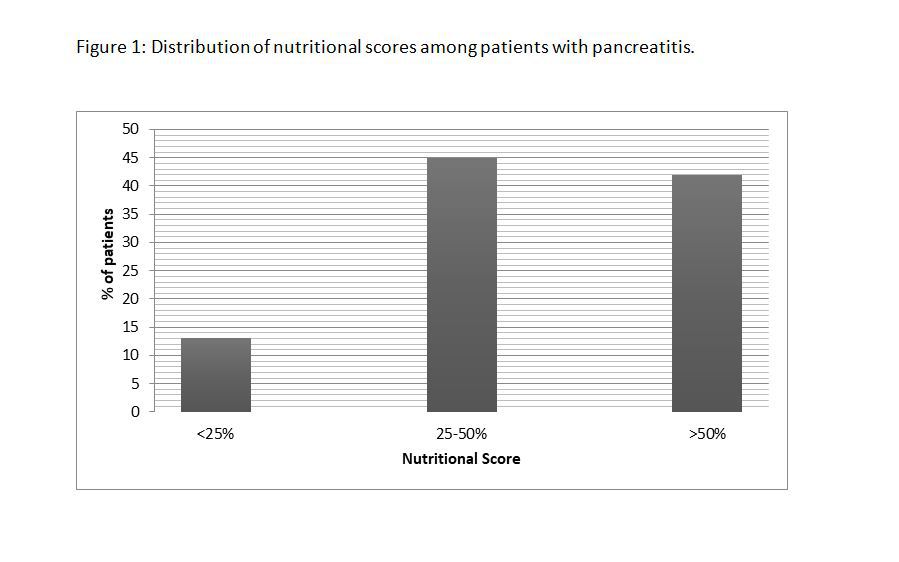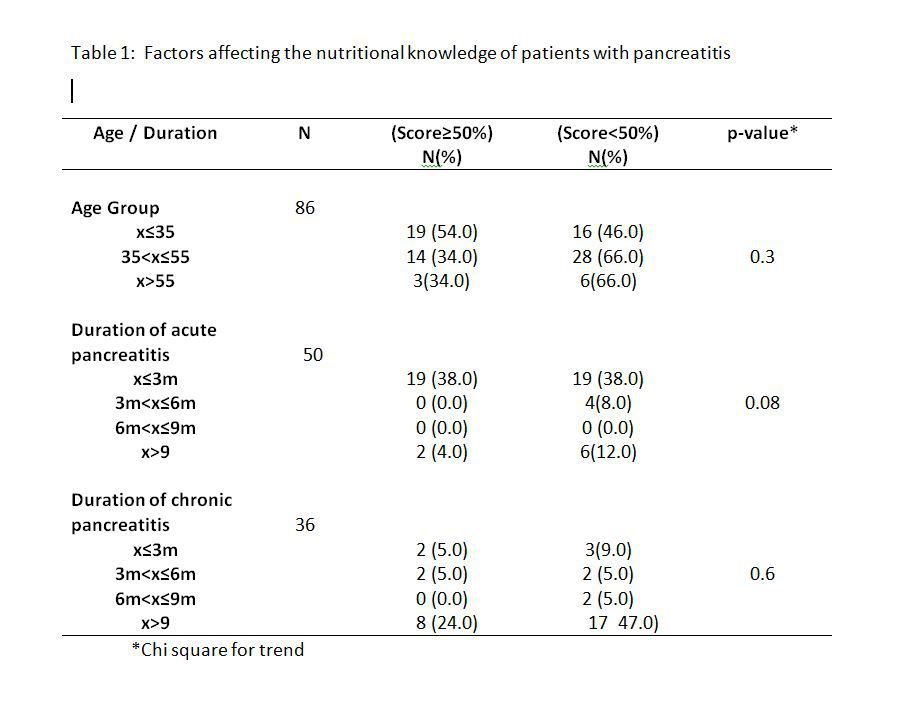|
Back to 2018 Posters
ASSESSMENT OF NUTRITIONAL KNOWLEDGE AND DIETARY PATTERNS OF PATIENTS WITH PANCREATITIS
Vikram Kate*1, Julia Sunil1, Subair Mohsina1, Vinodhini P1, Sathasivam Sureshkumar1, Thulasingam Mahalakshmy2
1Department of Surgery, Jawaharlal Institute of Postgraduate Medical Education and Research, Pondicherry, Pondicherry, India; 2Department of Preventive and Social Medicine, Jawaharlal Institute of Postgraduate Medical Education and Research, Pondicherry, India
Introduction- Understanding the existing dietary patterns and nutritional knowledge is important to avoid harmful and "non-evidence" based diets and to increase the dietary compliance. This study was carried out to assess the nutritional knowledge and the dietary pattern of patients with pancreatitis.
Methods-This was a prospective, cross-sectional study carried out in a tertiary -care centre during January -August 2017. All patients (>18years) admitted with pancreatitis were included in the study. A validated Food Frequency Questionnaire (FFQ) was used to assess the dietary pattern. An authorial questionnaire with 79 questions (55-open & 24-close-ended) was used to assess nutritional knowledge, attitude and adherence to dietary advice. Assessment of dietary pattern and nutritional knowledge were the primary outcomes. Adherence to the dietary advice, comparison of nutritional knowledge among patients of acute and chronic pancreatitis and identifying factors affecting nutritional knowledge and adherence were the secondary outcomes.
Results- 86 patients of pancreatitis (acute: 50, chronic: 36) were included. Majority were in the age group of 31-40 (40%) and were males (94%). In the majority of patients, duration of disease was less than 3 months in acute pancreatitis and >1 year in chronic pancreatitis. Restricted food-items were avoided by majority, such as fried snacks (34%), raw-chilly (67%), garlic (88%) and coffee (48%). Recommended food-items like cooked-vegetables (94%) was in practice but frequency of consumption of low-fat milk (0), egg (7/86), etc. were not adequate.73% of the patients knew that high fat oil consumption was detrimental to the condition. Nutritional knowledge score of the patients was suboptimal ( 45%)(Figure 1), however, 68% patients perceived their nutritional knowledge to be above average. Majority of the patients were not aware of risk factors for pancreatitis such as alcoholism, smoking, vitamin deficiency and diabetes. Doctor was the source of dietary-advice in 92% and only 32% were satisfied with the dietary-advice received. Adherence to dietary recommendation at follow-up was below average in 67% patients. There was no significant association between age (p=0.79), educational and economic status with adherence to recommended dietary pattern, abstinence from alcohol and smoking. Type of pancreatitis (p=0.207), age, educational status and duration did not significantly affect the nutritional knowledge of the patients (Table 1).
Conclusion: The dietary pattern, nutritional knowledge and adherence to recommendations in pancreatitis patients are insufficient and hence more emphasis should be given to nutritional education of these patients to improve compliance.


Back to 2018 Posters
|


